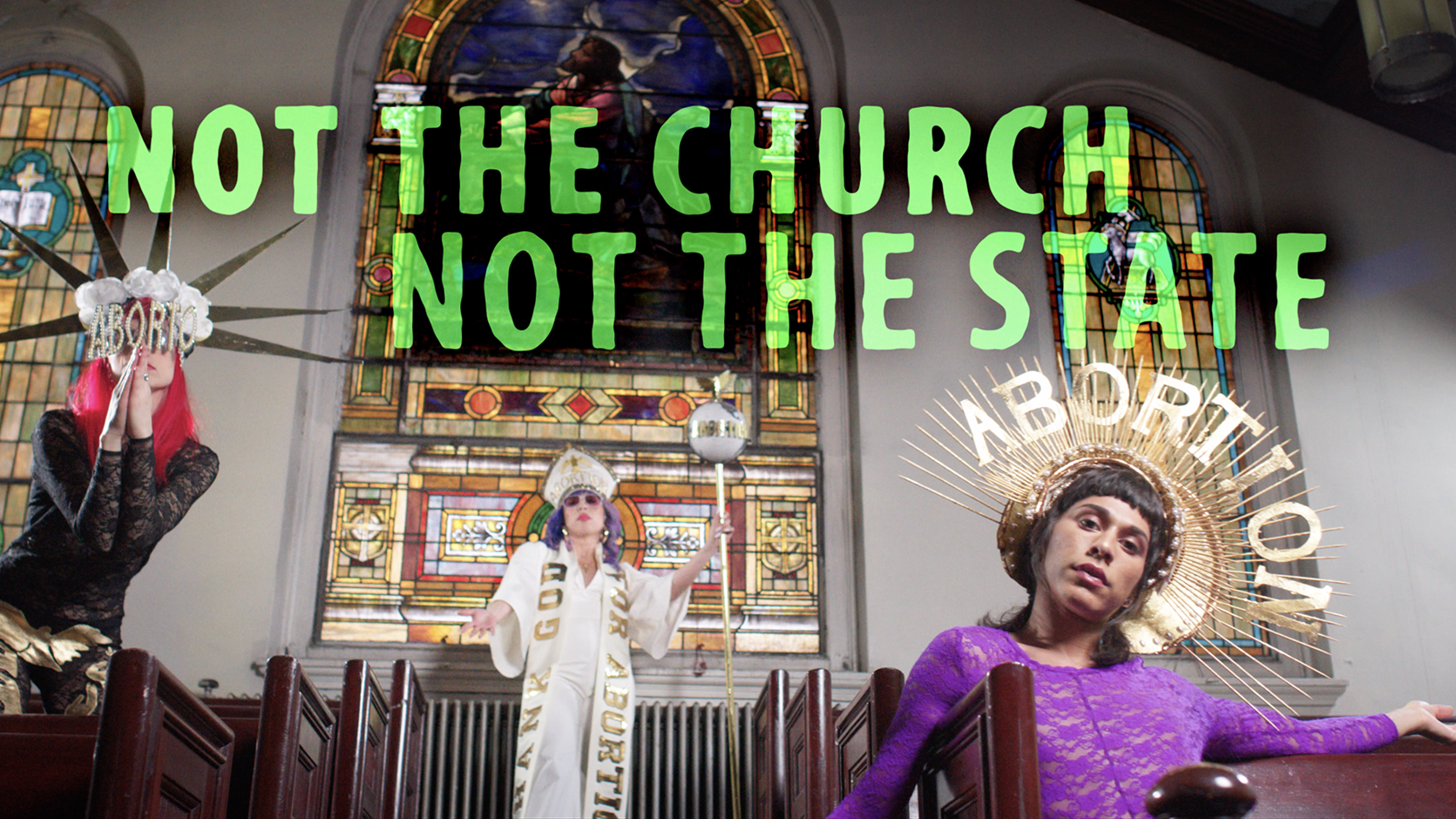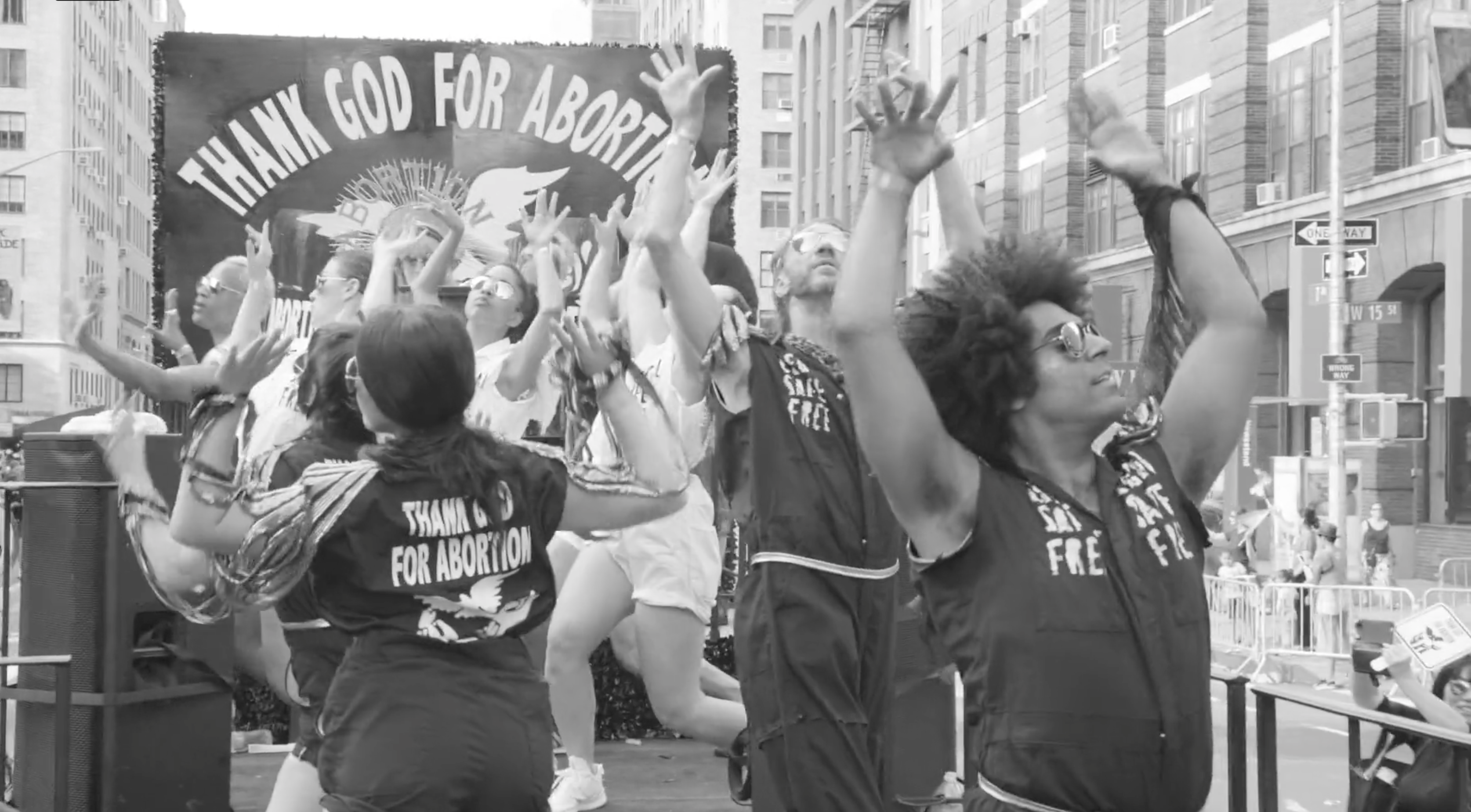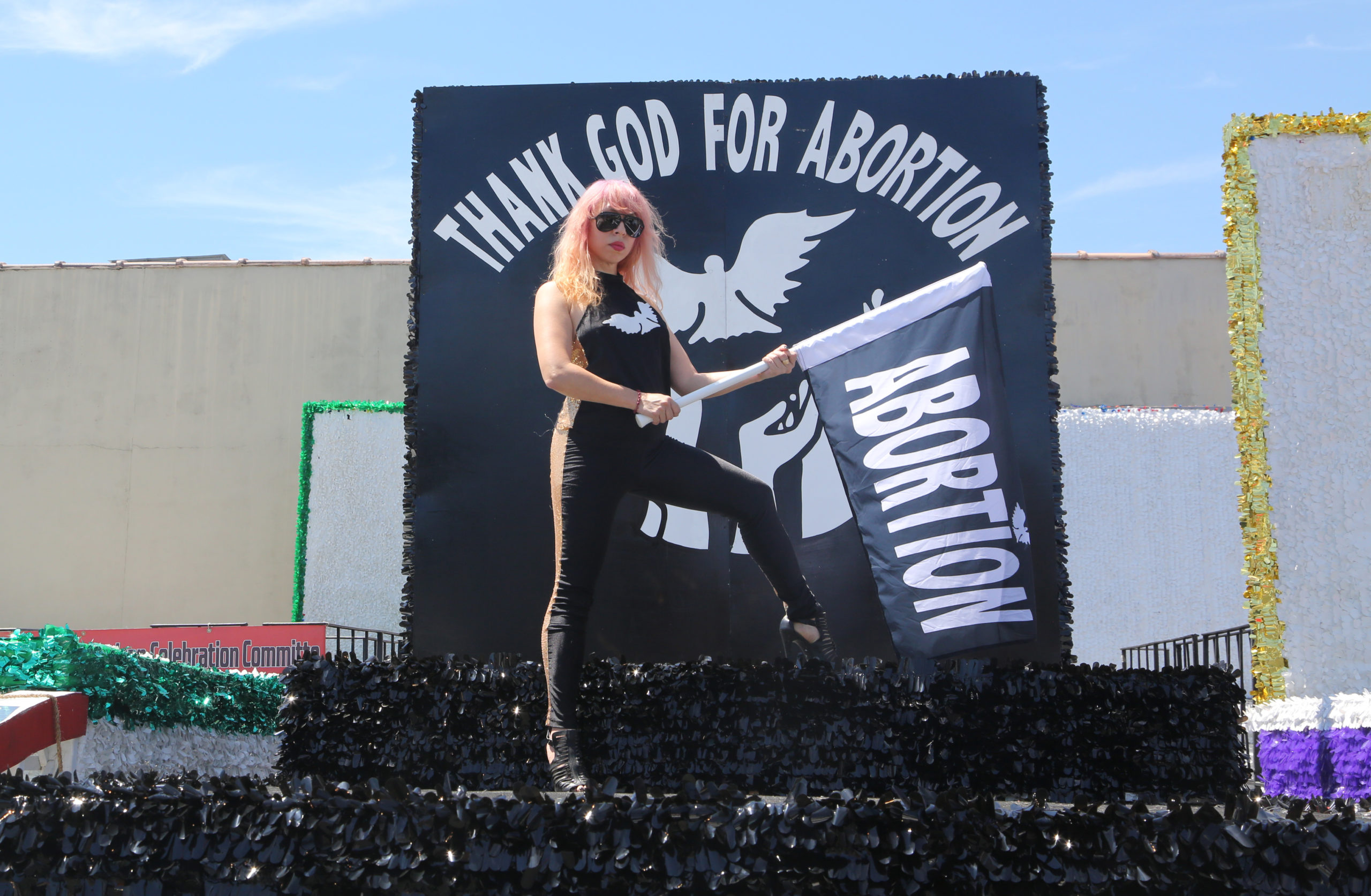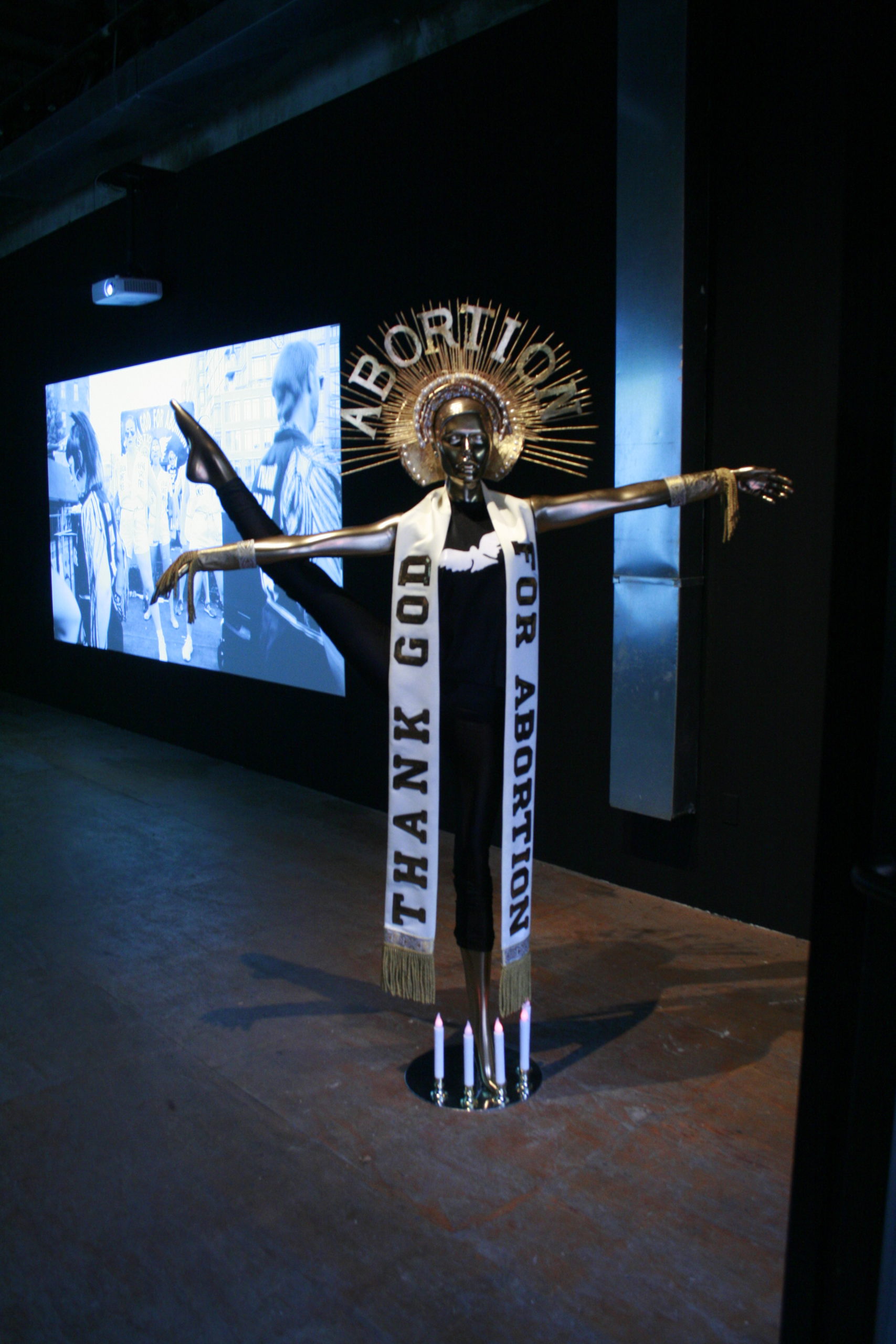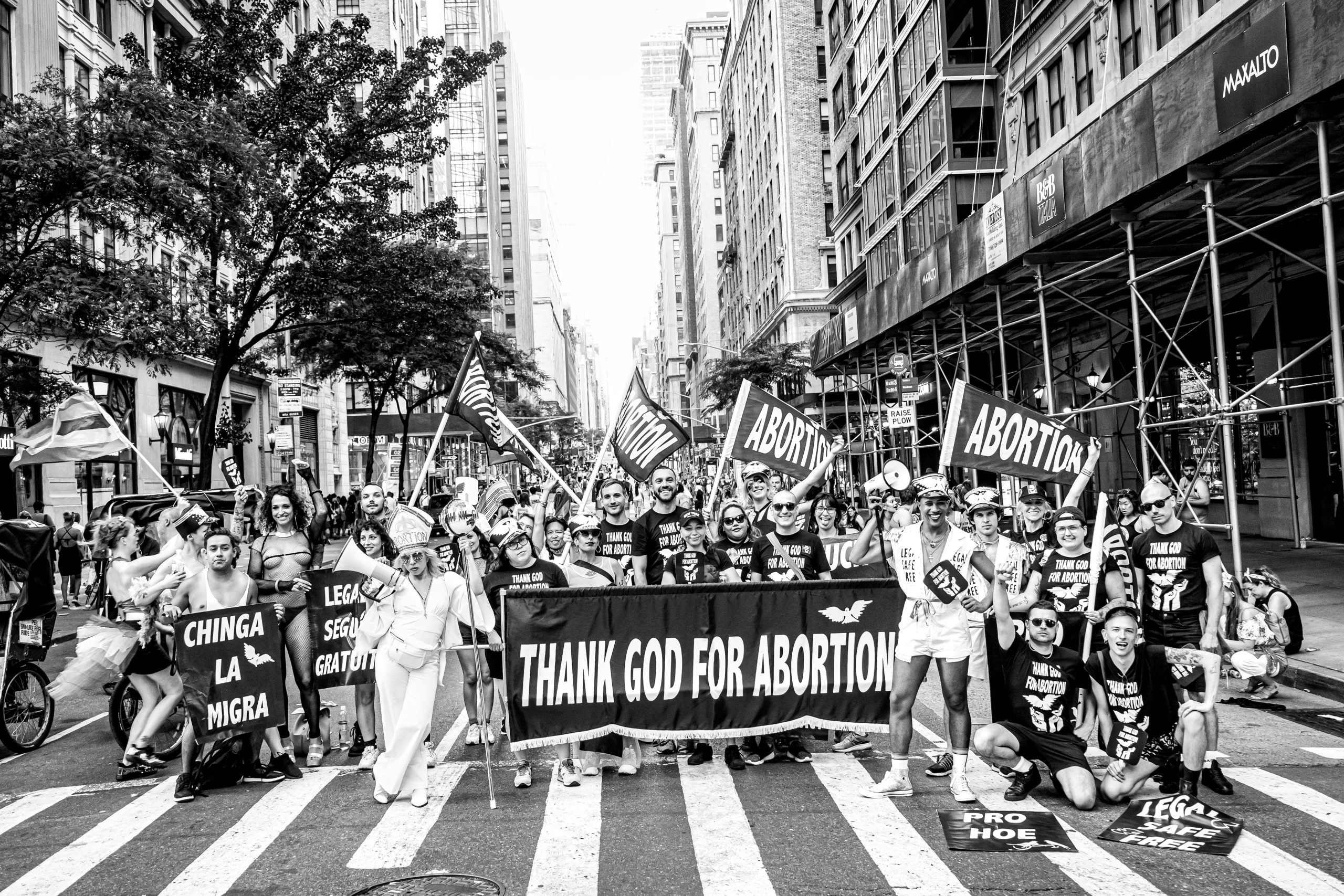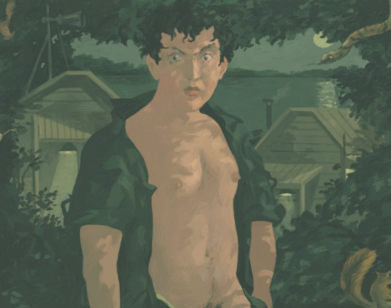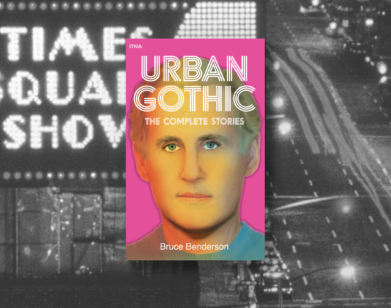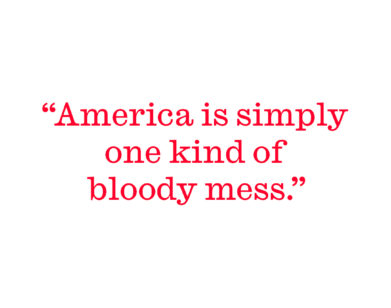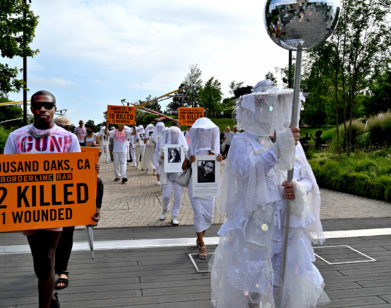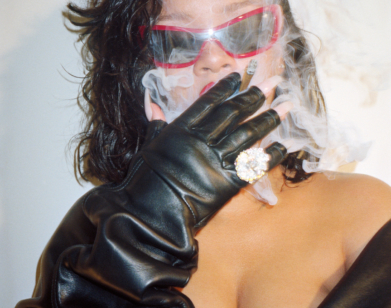JUSTICE
Viva Ruíz Wants to Thank God For Abortion
“We’re the abortion kiki. Everyone is invited,” says Viva Ruíz, the NYC nightlife icon and founder of the queer collective activism initiative Thank God For Abortion. Since 2015, the New York-based grassroots organization has become a leading force in the mobilization for abortion rights—they’ve had a float in NYC’s Heritage of Pride 2018, led this year’s Queer Liberation March, led protests in the streets of Washington DC, and created their eponymous t-shirts that double as polemic conversation starters. To help educate us on her mission, Ruiz sat down with Camila Valle, a leading member of NYC For Abortion Rights, to discuss the importance of including religion in the fight for reproductive justice. —MARIANA DE JESÚS
———
VIVA RUÍZ: Hi!
CAMILA VALLE: How are you?
RUÍZ: Oh my goodness, you know. What a world.
VALLE: What a world indeed. It is absolutely my honor to help you get the word out about Thank God For Abortion. I was raised by a Catholic mom who had three illegal abortions, and it was something we talked about a lot. I consider myself a person of faith, and it was when I encountered Thank God For Abortion [TGFA] it really landed. Whenever I wear my TGFA merch on the street, I get into some of the richest conversations I’ve ever gotten into with strangers about such a polarizing and loaded topic. I just wanted to start with a personal thank you from me. What’s the origin story for Thank God For Abortion?
RUÍZ: First of all, thank you! That is so meaningful! Okay, so 2014 is when I started having conversations that led to the manifestation of the 2015 artwork. At that time, a lot of my friends were having kids and I remember a good friend, a cis woman, was like, “Just do it, or you’ll regret it.” And I was like, “Eh.” I was in a place where my partner wanted to [have kids] and I just never really had that calling. I think that might have been the kickoff of TGFA. I remember being like, “I don’t have a biological clock. What is that about?” The other part was gay men who I loved who were having an incredibly rich sex life on their GPS and I was jealous and wanted that kind of safety. Depending on the body you’re in, we just don’t have the security that cis men have, even gay cis men, depending on race and class of course. Even my cis gay manfriends who were like the biggest whores—whores is a term that I exalt as retired sex worker—were shocked at God and abortion. So it was my cis friends, all liberal left, that inspired TGFA. If the dissonance we have is that immense on my corner, on my block, in the party, at the nightclub. How can we expect change? That normative, cis hetero patriarchy programming is here and it’s in me.
VALLE: Wow. That’s an incredible story. I know that you call yourself “nightlife educated/community educated,” which I wanna get into later, but maybe we could start with the question of how abortion has been so stigmatized in this country. In the U.S., the evangelical movement was able to capitalize on abortion. It has been a linchpin of the different factions of the right and the religious right in this country. This tying of God, spirituality, and religion with the question of abortion is really important. I know that you’re Ecuadorian. In Latin America, the Catholic church is very anti-abortion and puts a lot of resources into campaigning against it. But I grew up with a bunch of pro-abortion Catholics. One of the largest groups that mobilized for the legalization of abortion in Argentina was Catholics For The Right To Decide. So, in different contexts, there are different understandings of abortion and religion and spirituality. I wanted to hear your thoughts on that.
RUÍZ: It’s so beautiful to speak to you because we have a lot of the same roots: South America, the Christianity that is such a deep part of the culture, which is also colonization right? That’s how they got us.
VALLE: Yep.
RUÍZ: I know from my country, from my culture, and from my ancestors—the church is a very effective weapon. So I love to hear that your family were pro-choice Christians. My family is Christian, but they’re very typical in that they’re anti-abortion. That has taught me how to talk to about it, how can we meet people where they are? Instead of waiting on everything to change what can shift NOW. What is the increment possible, this is a harm reduction strategy. I don’t expect everyone to think like me, people are free to morally judge and have their beliefs—but that’s different than the law and that distinction is where I’ve seen people come around. We’re supposed to have a separation of church and state. So TGFA, the God part is because I do love God—that is an important thing to say because a lot of abortion activism has been led by white feminists who don’t want to talk about God. We do a disservice to the work when we judge people who have faith because a lot of people who need abortions believe in God. I didn’t really name God for a long time, but I have come back to God ‘cause of abortion. Abortion has given me more faith.
VALLE: Me too. I do a lot of work against the anti-abortion program of the Archdiocese of New York and the Catholic Church in New York. I have never felt so affirmed in my faith than when I see these people—I’m gonna start crying—talk in the name of their God and then do despicable things that are not Christian. I also had a long struggle with naming God. I mostly just referred to myself as a person of faith and I have my own understanding of spirituality. But by doing more and more abortion work, I’m closer to God. It’s been a really religious experience for me.
RUÍZ: I’ve always seen you, we’re in New York City together. It’s crucial for me to know you and to be connected to the actions that you’re doing because it is a fallacy that we’re separate. Whatever COVID did—it’s a deadly terrible time, but it’s also a very beautiful time where people are coming together. During Pride, the Queer Liberation March asked TGFA to lead them. When I tell you there has not been much love for abortion in Pride, I’m not lying. That was the genesis of this project. How can you see yourself separately from what gay people are enduring? Gay people have abortions! Trans people have abortions! Queer people have abortions!
VALLE: Especially with the fight around the AIDS epidemic and HIV. ACT UP taught us to fight for the life-saving medical healthcare and life-changing services that we deserve and are owed by the people who run our society. Maybe this is a good time to get into the question around pride and queer and trans liberation, and New York City nightlife and community-based organizing, and how TGFA is a child of that.
RUÍZ: TGFA is a kiki. We’re the abortion kiki and everybody’s invited. I’m not an institutionally educated person, I am a nightlife person. I’ve been a part of many legendary party circles in New York City. Here’s what queer people do: we turn looks. I was a stripper for many years. I used to call myself a professional exhibitionist—sex, body freedom, and pleasure have always been part of my personal revolution. As somebody who grew up in a binary gender jail because of machismo, and because of colonialism, those are the markings of my culture, especially from poverty. Poverty is harmful. It’s dangerous for people and survival really twists people into adhering to binary gender roles. If cis women are suffering, trans people, and Black trans people are suffering more. As Professor Kimberlé Crenshaw says, “intersectionality.” That’s the lens. Because of my intersections, sex work was a necessity. I’ve been trying to get free for a long time and TGFA is a part of that. So what we bring is joy ’cause that’s from our culture too, we party. We may not have the X-Y-Zs, but we will dance and we will eat. And that’s part of TGFA, that energy.
VALLE: I think we need more of that. More celebratory people, power, and joy. I think you actually said this to me in conversation once about Chris Smalls‘s fashion. You were like, “Chris Smalls is making the revolution irresistible.” I think about that a lot. When I see you at a parade with your abortion Pope high priestess get up—the magnetism of that should not be underestimated.
RUÍZ: Yes! the VIP Toni Cade Bambara wrote that genius quote, and some people truly embody that “As a culture worker who belongs to an oppressed people my job is to make revolution irresistible.”
VALLE: I think that’s the role of art, and the role of artists in the revolution. There’s a really rich Latin American tradition that sees art as feminist theory. Las Tesis in Chile did the choreography of “A Rapist In Your Path”/“Un Violador En Tu Camino” that was echoed in hundreds of other cities across the world with blindfolds. There was also in the Chicano movement, Asco! that took inspiration from the Catholic processions and walked the Chicano moratorium. Things like that are inspired by Latin American traditions, Catholic traditions, and art. I wanted to ask if you could say more about your role as an artist and whether you see TFGA as an art abortion project?
RUÍZ: Absolutely. My family has great artists, but they will never name themselves that because they were factory workers, they’re maintenance men. I didn’t know I was going to be an artist. I’ve been creating work outside those systems and it’s amazing to be recognized within it. The church taught me about costume design. The regalia of the church is a tool. There’s so much resistance to who gets to have art and sell art or sustain themselves with art. I’m like look, Damien Hirst and Matthew Barney can do whatever the fuck they want. So yeah, this t-shirt is fucking art. It’s doing what artwork is supposed to do. I grew up in New York in a time when it was gorgeous. My childhood memories are graffiti and street dancing. My favorite art is public art. My favorite artwork in the world is those mangoes that are cut into flowers. A lot of it is about a plurality of voices, like the storytelling movement—people talking about their abortions. I’m happy to be a part of that.
VALLE: I know you talk about TGFA as being divinely protected. I felt divinely protected throughout many different moments of my life, mostly from my mother. I think part of what you’re saying also is that anybody can do this. Anybody can be an artist if they want to be.
RUÍZ: Absolutely. Another hero of mine is Amma [Mata Amritanandamayi], from India who people call the hugging saint. She travels around and hugs people, that’s her thing, and then people buy things from her store and she builds schools, and bridges, and stuff. The concept is very simple. Access is a big word for me. So the shirt ended up being a tool.
VALLE: Mm-hmm.
RUÍZ: As we know, abortion bans are white supremacy. You can wear this shirt and have a conversation, and a conversation is an art form and a creative intervention. It can be very beautiful.
VALLE: Yeah.
RUÍZ: Because of the project I’ve been entrusted with many people’s abortion stories and it has shown me why I can’t stop. I feel like nobody needs to feel hopeless. I’d like to point to actions that people can take. There’s been a really prevalent white feminist, a narrative about Planned Parenthood being the face of abortion. We love Planned Parenthood, of course, but the fact is that independent clinics do most of the abortions and all of the ones that are the hardest to access and with the least amount of resources. The National Network of Abortion Funds is where people should donate to pay for people’s abortions at these independent clinics. Keep Our Clinics is the organization that fights to keep these clinics open, supports the practically. If people have money to aim and that is so important right now, give to NAAF and Keep Our Clinics. In NYC our abortion fund is New York Abortion Acess Fund, they are being overloaded with the influx of people all over the states and need donations to get everyone this critical health care. And of course if your in NYC join New York City For Abortion Rights, they’re mobilizing on the regular.
VALLE: Yes, we have a longstanding campaign that’s gearing up for a new stage in the fight against the Archdiocese of New York’s anti-abortion program which is called Witness For Life. We are out there the first Saturday of every month bright and early to meet the procession after Saturday mass. They do the religious procession to the Planned Parenthood a couple of blocks down where they harass patients and impersonate clinic escorts. We’re gearing up for a new stage in that fight too, so if you’re in New York, join us.
RUÍZ: Yes! There’s many many actions going on. As far as TGFA, we like to get on the streets, but I have a healthy fear of how the antis react to the abortion god thing. The TGFA hub in New York City is queer and trans BIPOC centric, so we have to mobilize where there’s the most safety. There’s always a thing, so people can look at our Instagram and stay in touch and join the party. Especially if you pull looks! We’re just doing what the church taught us to do, really. It’s that costuming, it’s that beauty. That’s the other thing about TGFA. I did not see joy like that in the movement.
VALLE: Yes.
RUÍZ: I wasn’t seeing so much of that, “Let’s have pleasure and ecstasy, divinity, perfection, and abortion and God in the same sentence, the same space.” I think that is the spell. Because at its core abortion bans are anti-sex. That’s a very gendered line, because not everybody’s punished for having sex.
VALLE: Right, and I think we can’t underestimate the legacy of the “safe, legal, and rare” argument where abortion is some kind of tragedy if it happens to you. It’s supposed to throw you into a moral dilemma that shakes your entire sense of self, you regret it and repent. But that’s not what abortion is like for most people. We should be celebrating the fact that we have that kind of agency over our lives and over our bodies.
RUÍZ: And it’s not an accident that our bodies experience pleasure. We’re made in the image of a God that orgasms often. My God comes every day. My job as an evangelist is to empower, to impress on people that we’re blessed, and that we’re innocent in the pleasure of our body. I’m speaking to Christians. Enjoy your body. Cis het white men get to, and we do too. We don’t need confession. We don’t need absolution. Healthcare is a right. We are allowed to have the sex we want with who we want when we want without punishment from the state.
VALLE: Mm-hmm!
RUÍZ: We are allowed to be in the bodies that we identify with, how we identify with. This is all the same! Trans rights are abortion rights.
VALLE: Yes.
RUÍZ: We’re on that road to caring for all of us. And there are all these movements that showed us how they didn’t let each other go—one of those is Act Up. But we can learn from their mistakes too, and when we’re not taking race and class into account, there are gonna be mistakes.
VALLE: Absolutely.
RUÍZ: You make this revolution irresistible to me.
VALLE: Right back at you.
RUÍZ: Don’t make me cry!
VALLE: Thank you so much.
RUÍZ: God bless you.


